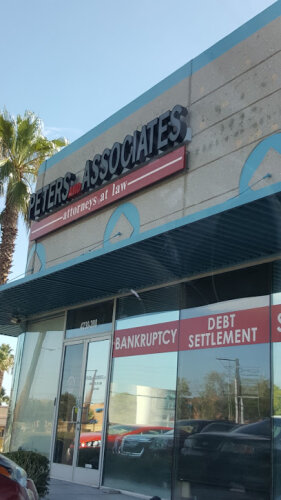Best Commercial Real Estate Lawyers in New Mexico
Share your needs with us, get contacted by law firms.
Free. Takes 2 min.
Free Guide to Hiring a Real Estate Lawyer
Or refine your search by selecting a city:
List of the best lawyers in New Mexico, United States
About Commercial Real Estate Law in New Mexico, United States
Commercial real estate law in New Mexico covers the legal framework related to the purchase, lease, sale, and development of property intended for business activities. This includes office buildings, shopping centers, warehouses, industrial properties, and land meant for commercial use. The laws governing commercial real estate are designed to protect the interests of buyers, sellers, landlords, tenants, and developers while fostering growth and compliance with local, state, and federal regulations. Navigating these laws can be complex, as they often intersect with zoning ordinances, environmental rules, contractual obligations, and financing terms.
Why You May Need a Lawyer
There are several situations where consulting a commercial real estate attorney in New Mexico can be invaluable:
- Drafting and reviewing purchase and sale agreements to ensure legal compliance and safeguard your interests.
- Negotiating and clarifying commercial lease terms for landlords or tenants, which are often more complicated than residential leases.
- Resolving disputes involving property boundaries, access, easements, or breaches of contract.
- Assisting with due diligence, including title searches and analysis of potential environmental issues.
- Counseling on land use, zoning, and development regulations specific to your commercial project.
- Handling financing matters, such as loan documentation, foreclosures, and structuring deals.
- Managing compliance with state, local, and federal laws that affect commercial property, such as ADA accessibility or environmental regulations.
- Facilitating real estate transactions involving multiple parties or complex ownership structures, such as LLCs or partnerships.
Local Laws Overview
Commercial real estate in New Mexico operates under a set of local and state regulations that buyers, sellers, landlords, tenants, and developers should be aware of:
- Zoning and Land Use Regulations: Local governments set zoning codes that dictate how land and properties can be used, including restrictions on commercial activities in certain zones. Rezoning or variances may be needed for specific projects.
- Environmental Concerns: State and federal laws address remediation, hazardous materials, and environmental impacts. Properties may require Phase I Environmental Site Assessments before transactions.
- Title and Recording Laws: New Mexico is a “notice” state, which means that proper recording of property interests is crucial to help establish priority of ownership.
- Commercial Leases: Unlike residential leases, commercial leases in New Mexico are generally governed by contract terms rather than detailed statutory protections. Lease negotiations are vital.
- Disclosure Requirements: Sellers have limited statutory duties to disclose certain facts, but thorough due diligence is recommended to identify hidden liabilities.
- Property Taxes and Assessments: Commercial properties are subject to property taxes assessed at the county level, and rates may vary significantly between municipalities.
- Construction and Development Permits: Building permits, impact fees, and inspections are typically required for new construction or significant renovations.
It is always best to consult a lawyer who specializes in New Mexico commercial real estate law to interpret how these and other regulations might apply to your specific situation.
Frequently Asked Questions
What is the difference between commercial and residential real estate in New Mexico?
Commercial real estate involves properties used for business purposes, such as offices, retail spaces, or warehouses, while residential real estate is intended for personal dwellings like homes or apartments. Commercial real estate transactions are subject to different rules, standards, and risks.
What should I look for in a commercial lease?
Pay close attention to terms such as rent, escalation clauses, duration, renewal options, maintenance responsibilities, permitted uses, insurance requirements, and clauses for defaults or early termination.
Do I need a lawyer to buy or sell commercial property in New Mexico?
While it is not legally required, commercial real estate transactions are complicated and often involve significant financial risks. A lawyer can help with contract preparation, title review, due diligence, and closing the transaction smoothly.
How are commercial property taxes determined?
Property taxes are assessed by the county based on the appraised value of the property. Rates and exemptions may differ depending on the location and property type.
What is a title search, and why is it important?
A title search reviews public records to confirm the legal ownership of a property and identify liens, encumbrances, or disputes. It protects buyers, lenders, and other parties from future ownership claims.
Can I change the use of a commercial property?
A change in use may require zoning approval or a variance from the local authority. Consulting with a lawyer and local planning department is recommended before making any alterations in property use.
Are there environmental requirements for commercial properties in New Mexico?
Yes. Environmental laws may require assessments of soil or groundwater contamination, especially for properties with a history of industrial or hazardous use. Failure to comply can result in liability for cleanup costs.
What are tenant improvement allowances?
These are funds or concessions provided by landlords to help tenants modify or renovate the commercial space to fit their needs. They are typically negotiated as part of the lease agreement.
How does financing for commercial real estate work?
Financing usually involves a commercial mortgage or loan from a bank or lending institution. Lenders often require detailed business and financial documentation, higher down payments, and shorter terms than residential loans.
What happens if there is a dispute between a commercial landlord and tenant?
Disputes are usually resolved according to the terms of the lease. If not, parties can seek mediation, arbitration, or take the matter to court. Having a well-drafted lease and legal counsel helps prevent and resolve disputes efficiently.
Additional Resources
If you need more information or services related to commercial real estate law in New Mexico, consider the following resources:
- New Mexico Real Estate Commission: Oversees licensing and regulation of real estate professionals within the state.
- New Mexico Association of Realtors: Provides support, advocacy, and resources for real estate professionals and consumers.
- County Assessor's Offices: Offer information on property tax assessments, property records, and exemptions.
- Local zoning/planning departments: Authorities for understanding zoning laws, land use regulations, and construction permit requirements.
- New Mexico Secretary of State: Useful for researching business entities and public records filings.
- State Bar of New Mexico - Real Property Division: Can assist in locating experienced commercial real estate attorneys in your area.
Next Steps
If you are involved in or planning a commercial real estate transaction in New Mexico, consider taking these steps:
- Gather all relevant documents related to the property, such as deeds, titles, surveys, and previous agreements.
- Identify your goals and any key concerns related to zoning, financing, environmental matters, or lease terms.
- Contact a qualified commercial real estate attorney who understands New Mexico law for a consultation.
- Work with your legal advisor to conduct due diligence, review contracts, and ensure all paperwork complies with applicable laws.
- Stay informed by consulting respected authorities or organizations in your community as you navigate your transaction or dispute.
Legal guidance can help protect your interests, save you time and money, and reduce the risks associated with commercial real estate in New Mexico.
Lawzana helps you find the best lawyers and law firms in New Mexico through a curated and pre-screened list of qualified legal professionals. Our platform offers rankings and detailed profiles of attorneys and law firms, allowing you to compare based on practice areas, including Commercial Real Estate, experience, and client feedback.
Each profile includes a description of the firm's areas of practice, client reviews, team members and partners, year of establishment, spoken languages, office locations, contact information, social media presence, and any published articles or resources. Most firms on our platform speak English and are experienced in both local and international legal matters.
Get a quote from top-rated law firms in New Mexico, United States — quickly, securely, and without unnecessary hassle.
Disclaimer:
The information provided on this page is for general informational purposes only and does not constitute legal advice. While we strive to ensure the accuracy and relevance of the content, legal information may change over time, and interpretations of the law can vary. You should always consult with a qualified legal professional for advice specific to your situation.
We disclaim all liability for actions taken or not taken based on the content of this page. If you believe any information is incorrect or outdated, please contact us, and we will review and update it where appropriate.
Browse commercial real estate law firms by city in New Mexico
Refine your search by selecting a city.












